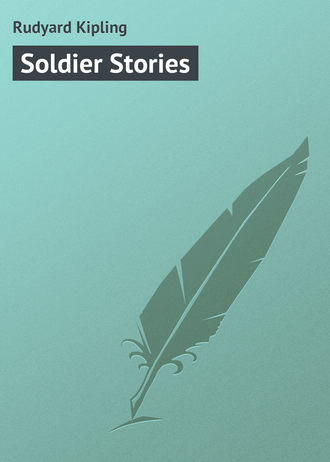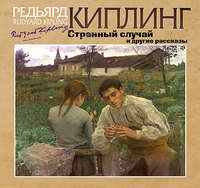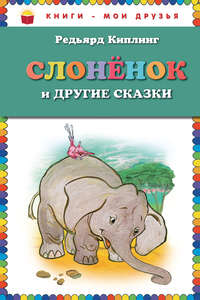 полная версия
полная версияSoldier Stories
'A Staff Orf'cer man, clean as a new rifle, rides up an' sez: "What damned scarecrows are you?"
'"A comp'ny av Her Majesty's Black Tyrone an' wan av the Ould Rig'mint," sez Crook very quiet, givin' our visitors the flure as 'twas.
'"Oh!" sez the Staff Orf'cer; "did you dislodge that Reserve?"
'"No!" sez Crook, an' the Tyrone laughed.
'"Thin fwhat the divil have ye done?"
'"Disthroyed ut," sez Crook, an' he took us on, but not before Toomey that was in the Tyrone sez aloud, his voice somewhere in his stummick: "Fwhat in the name av misfortune does this parrit widout a tail mane by shtoppin' the road av his betthers?"
'The Staff Orf'cer wint blue, an' Toomey makes him pink by changin' to the voice av a minowderin' woman an' sayin': "Come an' kiss me, Major dear, for me husband's at the wars an' I'm all alone at the Depot."
'The Staff Orf'cer wint away, an' I cud see Crook's shoulthers shakin'.
'His Corp'ril checks Toomey. "Lave me alone," sez Toomey, widout a wink. "I was his bâtman before he was married an' he knows fwhat I mane, av you don't. There's nothin' like livin' in the hoight av society." D'you remimber that, Orth'ris!'
'Hi do. Toomey, 'e died in 'orspital, next week it was, 'cause I bought 'arf his kit; an' I remember after that – '
'Guarrd, turn out!'
The Relief had come; it was four o'clock. 'I'll catch a kyart for you, Sorr,' said Mulvaney, diving hastily into his accoutrements. 'Come up to the top av the Fort an' we'll pershue our invistigations into M'Grath's shtable.' The relieved guard strolled round the main bastion on its way to the swimming-bath, and Learoyd grew almost talkative. Ortheris looked into the Fort ditch and across the plain. 'Ho! it's weary waitin' for Ma-ary!' he hummed; 'but I'd like to kill some more bloomin' Paythans before my time's up. War! Bloody war! North, East, South, and West.'
'Amen,' said Learoyd slowly.
'Fwhat's here?' said Mulvaney, checking at a blur of white by the foot of the old sentry-box. He stooped and touched it. 'It's Norah – Norah M'Taggart! Why, Nonie darlin', fwhat are ye doin' out av your mother's bed at this time?'
The two-year-old child of Sergeant M'Taggart must have wandered for a breath of cool air to the very verge of the parapet of the Fort ditch. Her tiny night-shift was gathered into a wisp round her neck and she moaned in her sleep. 'See there!' said Mulvaney; 'poor lamb! Look at the heat-rash on the innocint skin av her. 'Tis hard – crool hard even for us. Fwhat must it be for these? Wake up, Nonie, your mother will be woild about you. Begad, the child might ha' fallen into the ditch!'
He picked her up in the growing light, and set her on his shoulder, and her fair curls touched the grizzled stubble of his temples. Ortheris and Learoyd followed snapping their fingers, while Norah smiled at them a sleepy smile. Then carolled Mulvaney, clear as a lark, dancing the baby on his arm: —
'If any young man should marry you,Say nothin' about the joke;That iver ye slep' in a sinthry-box,Wrapped up in a soldier's cloak.'Though, on my sowl, Nonie,' he said gravely, 'there was not much cloak about you. Niver mind, you won't dhress like this ten years to come. Kiss your friends an' run along to your mother.'
Nonie, set down close to the Married Quarters, nodded with the quiet obedience of the soldier's child, but, ere she pattered off over the flagged path, held up her lips to be kissed by the Three Musketeers. Ortheris wiped his mouth with the back of his hand and swore sentimentally; Learoyd turned pink; and the two walked away together. The Yorkshireman lifted up his voice and gave in thunder the chorus of The Sentry Box, while Ortheris piped at his side.
''Bin to a bloomin' sing-song, you two?' said the Artilleryman, who was taking his cartridge down to the Morning Gun. 'You're over merry for these dashed days.'
'I bid ye take care o' the brat, said he,For it comes of a noble race,'Learoyd bellowed. The voices died out in the swimming-bath.
'Oh, Terence!' I said, dropping into Mulvaney's speech, when we were alone, 'it's you that have the Tongue!'
He looked at me wearily; his eyes were sunk in his head, and his face was drawn and white. 'Eyah!' said he; 'I've blandandhered thim through the night somehow, but can thim that helps others help thimselves? Answer me that, Sorr!'
And over the bastions of Fort Amara broke the pitiless day.
THE DRUMS OF THE FORE AND AFT
In the Army List they still stand as 'The Fore and Fit Princess Hohenzollern-Sigmaringen-Auspach's Merthyr-Tydfilshire Own Royal Loyal Light Infantry, Regimental District 329A,' but the Army through all its barracks and canteens knows them now as the 'Fore and Aft.' They may in time do something that shall make their new title honourable, but at present they are bitterly ashamed, and the man who calls them 'Fore and Aft' does so at the risk of the head which is on his shoulders.
Two words breathed into the stables of a certain Cavalry Regiment will bring the men out into the streets with belts and mops and bad language; but a whisper of 'Fore and Aft' will bring out this regiment with rifles.
Their one excuse is that they came again and did their best to finish the job in style. But for a time all their world knows that they were openly beaten, whipped, dumb-cowed, shaking, and afraid. The men know it; their officers know it; the Horse Guards know it, and when the next war comes the enemy will know it also. There are two or three regiments of the Line that have a black mark against their names which they will then wipe out; and it will be excessively inconvenient for the troops upon whom they do their wiping.
The courage of the British soldier is officially supposed to be above proof, and, as a general rule, it is so. The exceptions are decently shovelled out of sight, only to be referred to in the freshest of unguarded talk that occasionally swamps a Mess-table at midnight. Then one hears strange and horrible stories of men not following their officers, of orders being given by those who had no right to give them, and of disgrace that, but for the standing luck of the British Army, might have ended in brilliant disaster. These are unpleasant stories to listen to, and the Messes tell them under their breath, sitting by the big wood fires; and the young officer bows his head and thinks to himself, please God, his men shall never behave unhandily.
The British soldier is not altogether to be blamed for occasional lapses; but this verdict he should not know. A moderately intelligent General will waste six months in mastering the craft of the particular war that he may be waging; a Colonel may utterly misunderstand the capacity of his regiment for three months after it has taken the field; and even a Company Commander may err and be deceived as to the temper and temperament of his own handful: wherefore the soldier, and the soldier of to-day more particularly, should not be blamed for falling back. He should be shot or hanged afterwards – to encourage the others; but he should not be vilified in newspapers, for that is want of tact and waste of space.
He has, let us say, been in the service of the Empress for, perhaps, four years. He will leave in another two years. He has no inherited morals, and four years are not sufficient to drive toughness into his fibre, or to teach him how holy a thing is his Regiment. He wants to drink, he wants to enjoy himself – in India he wants to save money – and he does not in the least like getting hurt. He has received just sufficient education to make him understand half the purport of the orders he receives, and to speculate on the nature of clean, incised, and shattering wounds. Thus, if he is told to deploy under fire preparatory to an attack, he knows that he runs a very great risk of being killed while he is deploying, and suspects that he is being thrown away to gain ten minutes' time. He may either deploy with desperate swiftness, or he may shuffle, or bunch, or break, according to the discipline under which he has lain for four years.
Armed with imperfect knowledge, cursed with the rudiments of an imagination, hampered by the intense selfishness of the lower classes, and unsupported by any regimental associations, this young man is suddenly introduced to an enemy who in eastern lands is always ugly, generally tall and hairy, and frequently noisy. If he looks to the right and the left and sees old soldiers – men of twelve years' service, who, he knows, know what they are about – taking a charge, rush, or demonstration without embarrassment, he is consoled and applies his shoulder to the butt of his rifle with a stout heart. His peace is the greater if he hears a senior, who has taught him his soldiering and broken his head on occasion, whispering: 'They'll shout and carry on like this for five minutes. Then they'll rush in, and then we've got 'em by the short hairs!'
But, on the other hand, if he sees only men of his own term of service, turning white and playing with their triggers and saying: 'What the Hell's up now?' while the Company Commanders are sweating into their sword-hilts and shouting: 'Front-rank, fix bayonets. Steady there – steady! Sight for three hundred – no, for five! Lie down, all! Steady! Front-rank kneel!' and so forth, he becomes unhappy; and grows acutely miserable when he hears a comrade turn over with the rattle of fire-irons falling into the fender, and the grunt of a pole-axed ox. If he can be moved about a little and allowed to watch the effect of his own fire on the enemy he feels merrier, and may be then worked up to the blind passion of fighting, which is, contrary to general belief, controlled by a chilly Devil and shakes men like ague. If he is not moved about, and begins to feel cold at the pit of the stomach, and in that crisis is badly mauled and hears orders that were never given, he will break, and he will break badly; and of all things under the light of the Sun there is nothing more terrible than a broken British regiment. When the worst comes to the worst and the panic is really epidemic, the men must be e'en let go, and the Company Commanders had better escape to the enemy and stay there for safety's sake. If they can be made to come again they are not pleasant men to meet; because they will not break twice.
About thirty years from this date, when we have succeeded in half-educating everything that wears trousers, our Army will be a beautifully unreliable machine. It will know too much and it will do too little. Later still, when all men are at the mental level of the officer of to-day, it will sweep the earth. Speaking roughly, you must employ either blackguards or gentlemen, or, best of all, blackguards commanded by gentlemen, to do butcher's work with efficiency and despatch. The ideal soldier should, of course, think for himself – the Pocket-book says so. Unfortunately, to attain this virtue he has to pass through the phase of thinking of himself, and that is misdirected genius. A blackguard may be slow to think for himself, but he is genuinely anxious to kill, and a little punishment teaches him how to guard his own skin and perforate another's. A powerfully prayerful Highland Regiment, officered by rank Presbyterians, is, perhaps, one degree more terrible in action than a hard-bitten thousand of irresponsible Irish ruffians led by most improper young unbelievers. But these things prove the rule – which is that the midway men are not to be trusted alone. They have ideas about the value of life and an upbringing that has not taught them to go on and take the chances. They are carefully unprovided with a backing of comrades who have been shot over, and until that backing is re-introduced, as a great many Regimental Commanders intend it shall be, they are more liable to disgrace themselves than the size of the Empire or the dignity of the Army allows. Their officers are as good as good can be, because their training begins early, and God has arranged that a clean-run youth of the British middle classes shall, in the matter of backbone, brains, and bowels, surpass all other youths. For this reason a child of eighteen will stand up, doing nothing, with a tin sword in his hand and joy in his heart until he is dropped. If he dies, he dies like a gentleman. If he lives, he writes Home that he has been 'potted,' 'sniped,' 'chipped,' or 'cut over,' and sits down to besiege Government for a wound-gratuity until the next little war breaks out, when he perjures himself before a Medical Board, blarneys his Colonel, burns incense round his Adjutant, and is allowed to go to the Front once more.
Which homily brings me directly to a brace of the most finished little fiends that ever banged drum or tootled fife in the Band of a British Regiment. They ended their sinful career by open and flagrant mutiny and were shot for it. Their names were Jakin and Lew – Piggy Lew – and they were bold, bad drummer-boys, both of them frequently birched by the Drum-Major of the Fore and Aft.
Jakin was a stunted child of fourteen, and Lew was about the same age. When not looked after, they smoked and drank. They swore habitually after the manner of the Barrack-room, which is cold-swearing and comes from between clinched teeth; and they fought religiously once a week. Jakin had sprung from some London gutter, and may or may not have passed through Dr. Barnardo's hands ere he arrived at the dignity of drummer-boy. Lew could remember nothing except the Regiment and the delight of listening to the Band from his earliest years. He hid somewhere in his grimy little soul a genuine love for music, and was most mistakenly furnished with the head of a cherub: insomuch that beautiful ladies who watched the Regiment in church were wont to speak of him as a 'darling.' They never heard his vitriolic comments on their manners and morals, as he walked back to barracks with the Band and matured fresh causes of offence against Jakin.
The other drummer-boys hated both lads on account of their illogical conduct. Jakin might be pounding Lew, or Lew might be rubbing Jakin's head in the dirt, but any attempt at aggression on the part of an outsider was met by the combined forces of Lew and Jakin; and the consequences were painful. The boys were the Ishmaels of the corps, but wealthy Ishmaels, for they sold battles in alternate weeks for the sport of the barracks when they were not pitted against other boys; and thus amassed money.
On this particular day there was dissension in the camp. They had just been convicted afresh of smoking, which is bad for little boys who use plug-tobacco, and Lew's contention was that Jakin had 'stunk so 'orrid bad from keepin' the pipe in pocket,' that he and he alone was responsible for the birching they were both tingling under.
'I tell you I 'id the pipe back o' barracks,' said Jakin pacifically.
'You're a bloomin' liar,' said Lew without heat.
'You're a bloomin' little barstard,' said Jakin, strong in the knowledge that his own ancestry was unknown.
Now there is one word in the extended vocabulary of barrack-room abuse that cannot pass without comment. You may call a man a thief and risk nothing. You may even call him a coward without finding more than a boot whiz past your ear, but you must not call a man a bastard unless you are prepared to prove it on his front teeth.
'You might ha' kep' that till I wasn't so sore,' said Lew sorrowfully, dodging round Jakin's guard.
'I'll make you sorer,' said Jakin genially, and got home on Lew's alabaster forehead. All would have gone well and this story, as the books say, would never have been written, had not his evil fate prompted the Bazar-Sergeant's son, a long, employless man of five-and-twenty, to put in an appearance after the first round. He was eternally in need of money, and knew that the boys had silver.
'Fighting again,' said he. 'I'll report you to my father, and he'll report you to the Colour-Sergeant.'
'What's that to you?' said Jakin with an unpleasant dilation of the nostrils.
'Oh! nothing to me. You'll get into trouble, and you've been up too often to afford that.'
'What the Hell do you know about what we've done?' asked Lew the Seraph. 'You aren't in the Army, you lousy, cadging civilian.'
He closed in on the man's left flank.
'Jes' 'cause you find two gentlemen settlin' their diff'rences with their fistes you stick in your ugly nose where you aren't wanted. Run 'ome to your 'arf-caste slut of a Ma – or we'll give you what-for,' said Jakin.
The man attempted reprisals by knocking the boys' heads together. The scheme would have succeeded had not Jakin punched him vehemently in the stomach, or had Lew refrained from kicking his shins. They fought together, bleeding and breathless, for half an hour, and, after heavy punishment, triumphantly pulled down their opponent as terriers pull down a jackal.
'Now,' gasped Jakin, 'I'll give you what-for.' He proceeded to pound the man's features while Lew stamped on the outlying portions of his anatomy. Chivalry is not a strong point in the composition of the average drummer-boy. He fights, as do his betters, to make his mark.
Ghastly was the ruin that escaped, and awful was the wrath of the Bazar-Sergeant. Awful, too, was the scene in Orderly-room when the two reprobates appeared to answer the charge of half-murdering a 'civilian.' The Bazar-Sergeant thirsted for a criminal action, and his son lied. The boys stood to attention while the black clouds of evidence accumulated.
'You little devils are more trouble than the rest of the Regiment put together,' said the Colonel angrily. 'One might as well admonish thistledown, and I can't well put you in cells or under stoppages. You must be birched again.'
'Beg y' pardon, Sir. Can't we say nothin' in our own defence, Sir?' shrilled Jakin.
'Hey! What? Are you going to argue with me?' said the Colonel.
'No, Sir,' said Lew. 'But if a man come to you, Sir, and said he was going to report you, Sir, for 'aving a bit of a turn-up with a friend, Sir, an' wanted to get money out o' you, Sir – '
The Orderly-room exploded in a roar of laughter. 'Well?' said the Colonel.
'That was what that measly jarnwar there did, Sir, and 'e'd 'a' done it, Sir, if we 'adn't prevented 'im. We didn't 'it 'im much, Sir. 'E 'adn't no manner o' right to interfere with us, Sir. I don't mind bein' birched by the Drum-Major, Sir, nor yet reported by any Corp'ral, but I'm – but I don't think it's fair, Sir, for a civilian to come an' talk over a man in the Army.'
A second shout of laughter shook the Orderly-room, but the Colonel was grave.
'What sort of characters have these boys?' he asked of the Regimental Sergeant-Major.
'Accordin' to the Bandmaster, Sir,' returned that revered official – the only soul in the regiment whom the boys feared – 'they do everything but lie, Sir.'
'Is it like we'd go for that man for fun, Sir?' said Lew, pointing to the plaintiff.
'Oh, admonished – admonished!' said the Colonel testily, and when the boys had gone he read the Bazar-Sergeant's son a lecture on the sin of unprofitable meddling, and gave orders that the Bandmaster should keep the Drums in better discipline.
'If either of you comes to practice again with so much as a scratch on your two ugly little faces,' thundered the Bandmaster, 'I'll tell the Drum-Major to take the skin off your backs. Understand that, you young devils.'
Then he repented of his speech for just the length of time that Lew, looking like a Seraph in red worsted embellishments, took the place of one of the trumpets – in hospital – and rendered the echo of a battle-piece. Lew certainly was a musician, and had often in his more exalted moments expressed a yearning to master every instrument of the Band.
'There's nothing to prevent your becoming a Bandmaster, Lew,' said the Bandmaster, who had composed waltzes of his own, and worked day and night in the interests of the Band.
'What did he say?' demanded Jakin after practice.
''Said I might be a bloomin' Bandmaster, an' be asked in to 'ave a glass o' sherry-wine on Mess-nights.'
'Ho! 'Said you might be a bloomin' non-combatant, did 'e! That's just about wot 'e would say. When I've put in my boy's service – it's a bloomin' shame that doesn't count for pension – I'll take on as a privit. Then I'll be a Lance in a year – knowin' what I know about the ins an' outs o' things. In three years I'll be a bloomin' Sergeant. I won't marry then, not I! I'll 'old on and learn the orf'cers' ways an' apply for exchange into a reg'ment that doesn't know all about me. Then I'll be a bloomin' orf'cer. Then I'll ask you to 'ave a glass o' sherry-wine, Mister Lew, an' you'll bloomin' well 'ave to stay in the hanty-room while the Mess-Sergeant brings it to your dirty 'ands.'
''S'pose I'm going to be a Bandmaster? Not I, quite. I'll be a orf'cer too. There's nothin' like takin' to a thing an' stickin' to it, the Schoolmaster says. The reg'ment don't go 'ome for another seven years. I'll be a Lance then or near to.'
Thus the boys discussed their futures, and conducted themselves piously for a week. That is to say, Lew started a flirtation with the Colour-Sergeant's daughter, aged thirteen – 'not,' as he explained to Jakin, 'with any intention o' matrimony, but by way o' keepin' my 'and in.' And the black-haired Cris Delighan enjoyed that flirtation more than previous ones, and the other drummer-boys raged furiously together, and Jakin preached sermons on the dangers of 'bein' tangled along o' petticoats.'
But neither love nor virtue would have held Lew long in the paths of propriety had not the rumour gone abroad that the Regiment was to be sent on active service, to take part in a war which, for the sake of brevity, we will call 'The War of the Lost Tribes.'
The barracks had the rumour almost before the Mess-room, and of all the nine hundred men in barracks not ten had seen a shot fired in anger. The Colonel had, twenty years ago, assisted at a Frontier expedition; one of the Majors had seen service at the Cape; a confirmed deserter in E Company had helped to clear streets in Ireland; but that was all. The Regiment had been put by for many years. The overwhelming mass of its rank and file had from three to four years' service; the non-commissioned officers were under thirty years old; and men and sergeants alike had forgotten to speak of the stories written in brief upon the Colours – the New Colours that had been formally blessed by an Archbishop in England ere the Regiment came away.
They wanted to go to the Front – they were enthusiastically anxious to go – but they had no knowledge of what war meant, and there was none to tell them. They were an educated regiment, the percentage of school-certificates in their ranks was high, and most of the men could do more than read and write. They had been recruited in loyal observance of the territorial idea; but they themselves had no notion of that idea. They were made up of drafts from an over-populated manufacturing district. The system had put flesh and muscle upon their small bones, but it could not put heart into the sons of those who for generations had done overmuch work for over-scanty pay, had sweated in drying-rooms, stooped over looms, coughed among white-lead, and shivered on lime-barges. The men had found food and rest in the Army, and now they were going to fight 'niggers' – people who ran away if you shook a stick at them. Wherefore they cheered lustily when the rumour ran, and the shrewd, clerkly non-commissioned officers speculated on the chances of batta and of saving their pay. At Headquarters men said: 'The Fore and Fit have never been under fire within the last generation. Let us, therefore, break them in easily by setting them to guard lines of communication.' And this would have been done but for the fact that British Regiments were wanted – badly wanted – at the Front, and there were doubtful Native Regiments that could fill the minor duties. 'Brigade 'em with two strong Regiments,' said Headquarters. 'They may be knocked about a bit, though they'll learn their business before they come through. Nothing like a night-alarm and a little cutting up of stragglers to make a Regiment smart in the field. Wait till they've had half-a-dozen sentries' throats cut.'
The Colonel wrote with delight that the temper of his men was excellent, that the Regiment was all that could be wished and as sound as a bell. The Majors smiled with a sober joy, and the subalterns waltzed in pairs down the Mess-room after dinner, and nearly shot themselves at revolver-practice. But there was consternation in the hearts of Jakin and Lew. What was to be done with the Drums? Would the Band go to the Front? How many of the Drums would accompany the Regiment?








